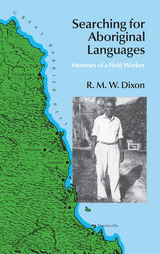2 books about Dixon, R. M. W.

A Grammar of Boumaa Fijian
R. M. W. Dixon
University of Chicago Press, 1988
The people who live in the Boumaa region of the Fijian island of Taveuni speak a dialect of Fijian that is mutually intelligible with Standard Fijian, the two differing as much perhaps as do the American and British varieties of English. During 1985, R. M. W. Dixon—one of the most insightful of linguists engaged in descriptive studies today—lived in the village of Waitabu and studied the language spoken there. He found in Boumaa Fijian a wealth of striking features unknown in commonly studied languages and on the basis of his fieldwork prepared this grammar.
Fijian is an agglutinating language, one in which words are formed by the profligate combining of morphemes. There are no case inflections, and tense and aspect as shown by independent clitics or words within a predicate complex. Most verbs come in both transitive and intransitive forms, and nouns can be build up regularly from verbal parts and verbs from nouns. The language is also marked by a highly developed pronoun system and by a vocabulary rich in areas of social significance.
In the opening chapters, Dixon describes the Islands' political, social, and linguistic organization, outlines the main points of Fijian phonology, and presents an overview of the grammar. In succeeding chapters, he examines a number of grammatical topics in greater detail, including clause and phrase structure, verbal syntax, deictics, and anaphora. The volume also includes a full vocabulary of all forms treated in discussion and three of the fifteen texts recorded from monolingual village elders on which the grammar is based.
Fijian is an agglutinating language, one in which words are formed by the profligate combining of morphemes. There are no case inflections, and tense and aspect as shown by independent clitics or words within a predicate complex. Most verbs come in both transitive and intransitive forms, and nouns can be build up regularly from verbal parts and verbs from nouns. The language is also marked by a highly developed pronoun system and by a vocabulary rich in areas of social significance.
In the opening chapters, Dixon describes the Islands' political, social, and linguistic organization, outlines the main points of Fijian phonology, and presents an overview of the grammar. In succeeding chapters, he examines a number of grammatical topics in greater detail, including clause and phrase structure, verbal syntax, deictics, and anaphora. The volume also includes a full vocabulary of all forms treated in discussion and three of the fifteen texts recorded from monolingual village elders on which the grammar is based.
[more]

Searching for Aboriginal Languages
Memoirs of a Field Worker
R. M. W. Dixon
University of Chicago Press, 1989
In 1963 R. M. W. (Bob) Dixon set off for Australia, where he was to record, chart, and preserve several of the complex and nearly extinct Aboriginal languages. Beginning with his introduction to these languages while a graduate student at the University of Edinburgh and his difficulties in getting to the Australian bush, Dixon's fourteen-year tale is one of frustration and enlightenment, of setbacks and discoveries.
As he made his way through northern Australia, Dixon was dependent on rumors of Aboriginal speakers, the unreliable advice of white Australians, and the faulty memories of many of the remaining speakers of the languages. Suggestions of informants led him on a circuitous trail through the bush, to speakers such as the singer Willie Kelly in Ravenshoe, who wanted his recordings sent to the south, "where white people would pay big money to hear a genuine Aborigine sing" and Chloe Grant in Murray Upper, who told tales in four dialects of digging wild yams, of the blue-tongue lizard Banggara, and of the arrival of Captain Cook. Dixon tells of obtaining the trust of possible informants, of learning the customs and terrain of the country, and of growing understanding of the culture and tradition of his subjects. And he explains his surprise at his most unexpected discovery: that the rich oral tradition of the "primitive" Aborigines could yield a history of a people, as told by that people, that dates to almost ten millenia before.
As he made his way through northern Australia, Dixon was dependent on rumors of Aboriginal speakers, the unreliable advice of white Australians, and the faulty memories of many of the remaining speakers of the languages. Suggestions of informants led him on a circuitous trail through the bush, to speakers such as the singer Willie Kelly in Ravenshoe, who wanted his recordings sent to the south, "where white people would pay big money to hear a genuine Aborigine sing" and Chloe Grant in Murray Upper, who told tales in four dialects of digging wild yams, of the blue-tongue lizard Banggara, and of the arrival of Captain Cook. Dixon tells of obtaining the trust of possible informants, of learning the customs and terrain of the country, and of growing understanding of the culture and tradition of his subjects. And he explains his surprise at his most unexpected discovery: that the rich oral tradition of the "primitive" Aborigines could yield a history of a people, as told by that people, that dates to almost ten millenia before.
[more]
READERS
Browse our collection.
PUBLISHERS
See BiblioVault's publisher services.
STUDENT SERVICES
Files for college accessibility offices.
UChicago Accessibility Resources
home | accessibility | search | about | contact us
BiblioVault ® 2001 - 2024
The University of Chicago Press









